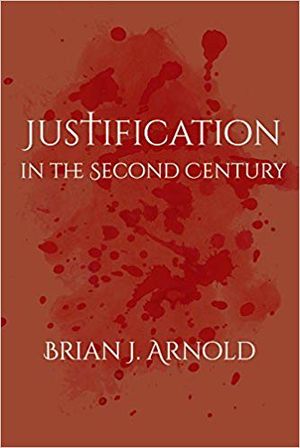Justification in the Second Century (2017 Arnold), book
Justification in the Second Century (2017) is a book by Brian J. Arnold.
Abstract
"T. F. Torrance’s influential The Doctrine of Grace in the Apostolic Fathers (1948) relegated the collection of Christianity’s earliest noncanonical witnesses to a fall from grace. According to Torrance, the Apostolic Fathers abandoned Paul’s "justification by faith" and instead advocated for various forms of "works righteousness." ... Given the new perspectives on both Paul and first-century Judaism, Brian Arnold challenges Torrance’s judgments of the Apostolic Fathers by assessing the clarity, prevalence, and importance of Paul’s doctrine of justification one hundred years after Paul’s death (ca. 165 CE). Arnold carefully examines the ancient writings of Clement of Rome, Ignatius of Antioch, and Justin Martyr, as well as the Epistle to Diognetus and the Odes of Solomon, providing close readings of key texts. Arnold concludes, contrary to Torrance, that Paul’s teaching on justification is present, understood, and important in second-century writings. Arnold opposes arguments that claim the Early Church Fathers either misunderstood Paul or were uninterested in the doctrine. Arnold shows that Christianity, in its earliest practices, emphasized the virtuous life that must follow one’s baptism, while also contending that faith is the only prerequisite for justification ... While second-century Christian literature may not mimic Paul’s language at every point, Arnold shows that the essence of Pauline soteriology―the liberation and new life that faith in Christ’s atoning death provides apart from law―continues to be a dominant theme of Christian reflection, praxis, and worship."--Publisher description (I).
"This book seeks to answer the following question: how did the doctrine of justification fare one hundred years after Paul's death (c. AD 165)? This book argues that Paul's view of justification by faith is present in the second century, a thesis that particularly challenges T. F. Torrance's long-held notion that the Apostolic Fathers abandoned this doctrine (The Doctrine of Grace in the Apostolic Fathers, 1948). In the wake of Torrance's work there has been a general consensus that the early fathers advocated works righteousness in opposition to Paul's belief that an individual is justified before God by faith alone, but second-century writings do not support this claim. Each author examined-Clement of Rome, Ignatius of Antioch, Epistle to Diognetus, Odes of Solomon, and Justin Martyr-contends that faith is the only necessary prerequisite for justification, even if they do indicate the importance of virtuous living. This is the first major study on the doctrine of justification in the second century, thus filling a large lacuna in scholarship. With the copious amounts of research being conducted on justification, it is alarming that no work has been done on how the first interpreters of Paul received one of his trademark doctrines. It is assumed, wrongly, that the fathers were either uninterested in the doctrine or that they misunderstood the Apostle. Neither of these is the case. This book is timely in that it enters the fray of the justification debate from a neglected vantage point."--Publisher description (II).
Editions
Published in Minneapolis, MN : Fortress Press, 2013.
Contents
Acknowledgements ; Contents ; List of Abbreviations ; 1. Introduction ; 1.1 Paul and the Second Century ; 1.2 Torrance and the Doctrine of Grace ; 1.3 Justification in the Fathers ; 2. "But Through Faith": Clement of Rome ; 2.1 The Background ; Authorship ; Date.; 2.2 Summary of 1 Clement 2.3 Translation and Commentary ; anslation of 32.3-4 ; 2.4 Objections and Responses ; 2.5 Conclusion ; 3. "Faith and Love": Ignatius of Antioch ; 3.1 Background ; Manuscripts ; Antioch ; 3.2 The Negative: What Justification is not ; Ignatius's Opponents.; "We Love the Prophets" "Parting of the Ways"? ; Jewish Practices ; Ignatius, Paul, and Judaism ; 3.3 The Positive: Justification in Ignatius ; Faith and Love ; The Gospel ; Justification ; Excursus: Prayer and Justification ; Ignatius and Paul? ; 3.4 Martyrdom ; 3.5 Conclusion.; 4 "O Sweet Exchange!": Epistle to Diognetus 4.1 Background ; Genre ; Authorship ; Date ; 4.2 The Text: Summary, Translation, Commentary ; Summary ; Translation ; Commentary ; 4.3 Theological Considerations: Atonement and Justification ; Atonement ; Justification.
External links
- [ Google Books]
